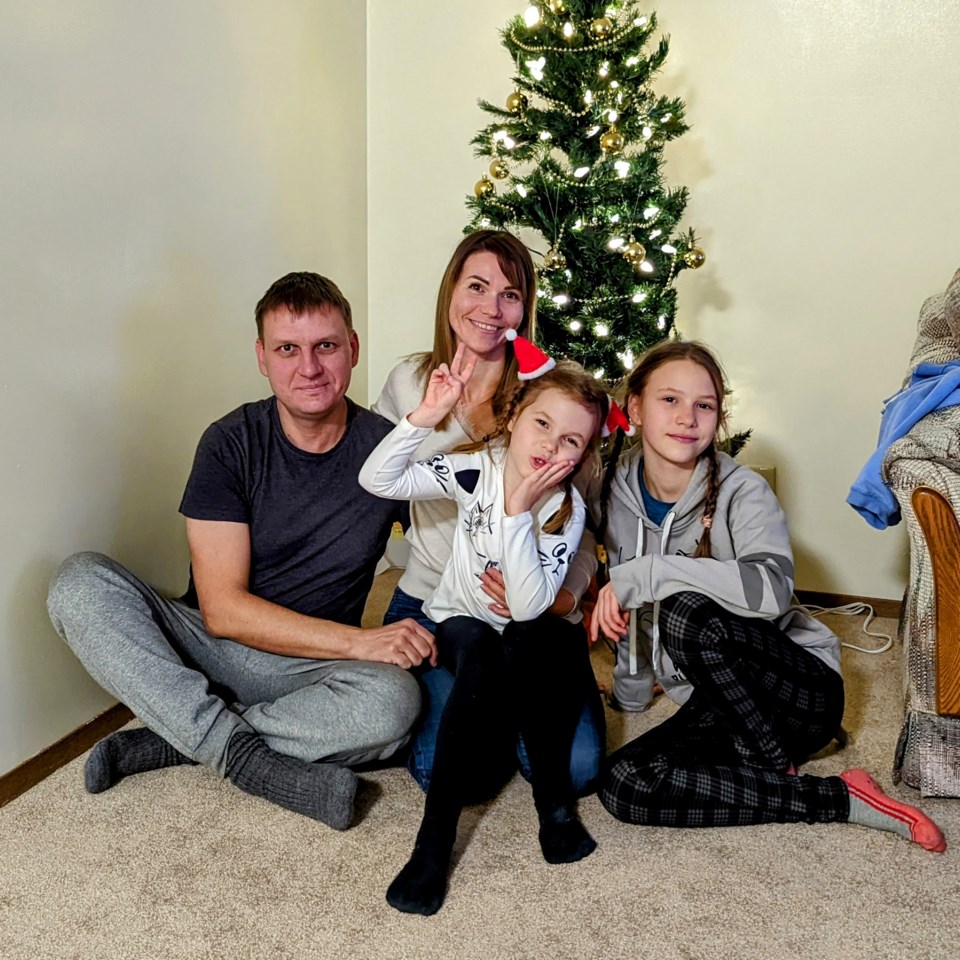Dar’ya and Sergei Shyshko and their daughters Masha and Milana are now safe in Moose Jaw following their escape from their hometown of Kherson in Ukraine, where they suffered three months of terroristic occupation by Russian invaders.
Dar’ya Shyshko told her story in an interview with MooseJawToday.com.
[Warning: this article contains graphic descriptions of war and war crimes. Reader discretion is advised.]
The first part of that story is her account of the initial attack on Kherson. Russian forces broke through the city’s defences on March 1 and had complete control by the end of March 2.
Shyshko, 39, described watching Russian forces roll through the city for days.
“You could see, there’s just kilometres of military equipment and military cars and tanks — lots of them. We saw them, they were just coming and coming, because we’re like an entrance gate for them … from Crimea.”
Traumatizing as it was to watche her city used as a staging point for the invasion of her country, that experience could not compare to what came next: Occupation by undisciplined men with guns, whose leaders apparently did not care to restrain them.
“They had an order not to let anyone out,” she said. “And there was a curfew from eight o’clock in the evening. You are not allowed on the streets, or you will be killed. Anyone on the streets, they just shoot you, that’s all.”
Shyshko said that while it was awful in the city, they suffered less than the smaller villages the Russians occupied. On the rare occasions they had power and an internet connection, she and others would communicate on social media. The experiences shared through group chats on Telegram were horrific.
“People say, ‘I can imagine.’ They can’t imagine. They are evil over there. They are like animals. Some of them, maybe they’re fine, but most of them? They just steal stuff, they come into the houses, they take whatever they want, they rape women and children… There is so many scary stories over there.
“Even when they drove, they didn’t follow any rules. They got into car crashes and killed people. You know how many people they killed just driving around in our hometown?”
There was no controlling them, Shyshko said. "They had guns, and thought they were kings."
At one point, she said goodbye to her children, just in case, then left to another room so they wouldn’t see her cry.
Surviving under occupation
“Some people, they left the first day. But after that, those people who stayed had somehow to survive.”
When the invasion began, there was a rush on gas stations, grocery stores, and pharmacies. The battle for Mykolaiv started immediately after Kherson’s capture, and Russian forces mined the fields and roads and set up checkpoints.
“In one week, everything was empty,” Shyshko said. “The Russians didn’t let any medication into the city, any food, nothing. … But we still had farmers who grew their own food, who had chickens and cows … so they were still bringing us (eggs and dairy products).”
Prices for everything skyrocketed, and some turned to profiteering. Others gave away what food they could bring in. Shyshko’s family had canned food storage, but after the first three weeks of March, they were running out. So, Shyshko’s husband Sergei went out and joined the long lines for bread, and searched for other sources of food to stockpile.
“We had our canned food … but we ran out of things like sugar, flour, stuff like that. Our bread factories still produced bread … they came into the neighbourhoods, and in the beginning they were giving out bread.
“We didn’t know how long we would have to keep that bread,” she explained, “so we were drying the bread in the oven and freezing it when we had power.”
Power blackouts were the norm. When the electricity came back on, they would charge their phones so their children could watch cartoons.
Artillery stationed nearby fired continuously. The explosions were so loud they could be physically felt sometimes.
“At the bomb shelter, they said maybe if the entrance collapsed we would all be trapped ... so they suggested for us to stay in our houses and apartments, just between two walls, far away from the windows,” Shyshko explained. “We taped our windows so they wouldn’t break into small pieces when there was an explosion.
“We took off all the glass from our walls, all the picture frames, everything. And we were either in the corridor between two walls or in the bathroom. We were hiding.
“We lived like that for three months.”
Escaping occupation
After months of constant stress and fear, Shyshko and her husband decided they had to try and leave. You couldn’t call it living, she said, what we were doing.
In the beginning, there were rallies against the occupiers. People chanted, Kherson is Ukraine, Kherson is Ukraine, this is our land.
A defiant population shared pictures and videos of Russian war crimes and Shyshko said she made posts on Facebook in support of Ukraine, calling for NATO to close the sky.
A Russian crackdown put an end to public demonstrations.
“They followed lots of people who are participating in these rallies,” Shyshko said. “And they tortured them to death. Lots of people are still missing.”
Russian soldiers, supposedly searching for weapons and hunting partisans, were going door-to-door — looting, killing, raping, and torturing.
“Our lives were at stake,” Shyshko said. “I am Ukrainian, and they will search my phone and they will see evidence that I don’t like Russia.”
They knew they had to get out.
[This is the second part of a three-part story, from an interview with Dar’ya Shyshko. The first article covers the initial invasion of Kherson in the early days of the war, and the third tells the story of their arrival in Moose Jaw — and the welcome they’ve received here.]




